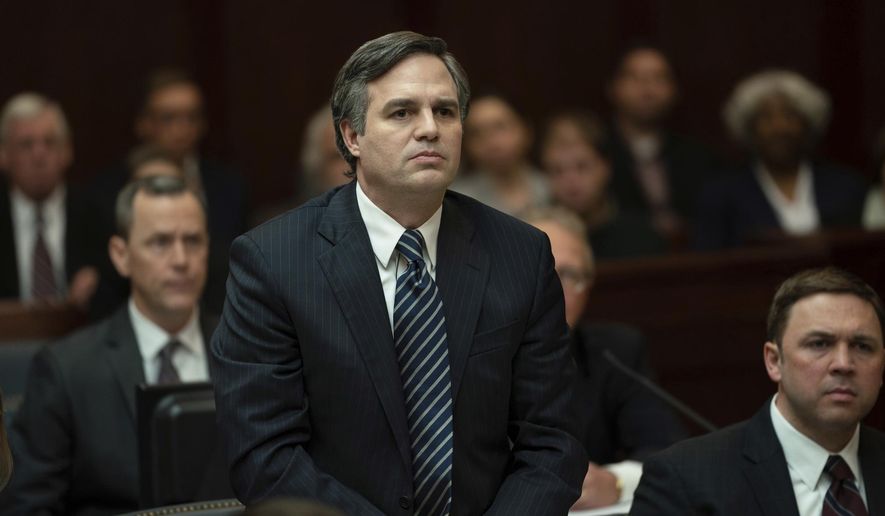OPINION:
Mark Ruffalo, who is probably best known for playing Dr. Bruce Banner in the movies set in the Marvel Comics Universe, testified before Congress last week about the alleged dangers posed by PFAS, a group of chemicals some have alleged are poisoning the nation’s groundwater.
What makes him an expert on the subject? He’s not a PhD scientist or expert researcher; he’s an actor. He did play a scientific type in The Hulk and the Marvel Avengers movies, but his experiments didn’t exactly turn out well. His appearance before Congress is tied to a new movie — “Dark Waters” — which opened Friday in New York and Los Angeles and will open in theaters across the country in December.
In that film, “Dark Waters,” which is being marketed as having been “inspired by true events,” Mr. Ruffalo plays Rob Billot, an attorney who’s spent most of the last 20 years leading a class-action suit filed in West Virginia against a major U.S. chemical company alleging it poisoned the groundwater in communities in the Ohio River Valley with chemicals known as PFASs that are used in everything from the manufacture of Teflon to firefighting foam and medical devices.
The issues involved in the case are complicated, so Hollywood has simplified them, making Billot and the attorneys fighting for the people living in the allegedly affected communities — who are reportedly not shown in the best light — the heroes and big, bad heartless American business as the villain. That’s one of the nice things about the movies — they don’t have to adhere to the truth even when they’re telling an allegedly true story. It’s the narrative that matters, not the facts.
The folks behind this movie, who’ve been thusly described as a well-financed network of political activists, investors, trial attorneys and Hollywood progressives, are using the film to influence the public attitude about what happened in this case and others. The events and lawsuits depicted in the movie ended with settlements in the neighborhood of three-quarters of a billion dollars which has led, unsurprisingly, to state attorney generals and other law firms looking to pick up the banner where the events depicted in “Dark Waters” stopped.
All of this happened in light of numerous studies calling into question the idea these chemicals are harmful to humans or animals. A 1999 study conducted by leading veterinarians and backed by the U.S. Environmental Protection Agency concluded the cows at one of the farms depicted in “Dark Waters” died as a result of malnutrition, endophyte toxicity, pinkeye and copper deficiency — not PFAS exposure. A 2012 study found no probable link between the substances and common infections, including influenza and dental cavities. And a 2014 study concluded that, as “occupational exposure to PFOA and PFOS is one to two orders of magnitude higher than environmental exposure, the discrepant positive findings are likely due to chance, confounding, and/or bias” that the evidence did not support “the hypothesis of a causal association between PFOA or PFOS exposure and cancer in humans.”
All that matters in a court of law, even when a defendant decides its cheaper to settle without any admission of wrongdoing than it is to fight for what’s right. That’s something the trial bar counts on when filing these major class actions and now, it appears, they’ve got Hollywood to help them. Films like this, and if this project works expect to see more of them, are all about spreading fear and outrage that can influence the potential jury pool and be used to hijack the public policy process.
None of this is happening by happenstance. One of the producers involved in the making of this film has spent years working alongside private foundations and the University of Southern California to determine how best to use movies to spur people to action. Participant Media, which has been described in published reports as “an activist entertainment company that delivers movies with a message” has reportedly been working with the Bill & Melinda Gates Foundation, the Knight Foundation and the University of Southern California’s Annenberg School for Communication and Journalism to determine just what it is about a movie that will capture the public’s interest and move people to action.
Sam Goldwyn, one of the giants of old Hollywood, used to say, “If you want to send a message use Western Union.” That attitude has been replaced by high-tech algorithms and motivation studies that are turning “Our best form of entertainment” into progressive propaganda vehicles. And the Democrats in Congress, rather than investigate this not-so-subtle form of public manipulation have instead, by calling Mr. Ruffalo to testify on the issue, decided to give one of the new cinema’s initial products a giant commercial.




Please read our comment policy before commenting.